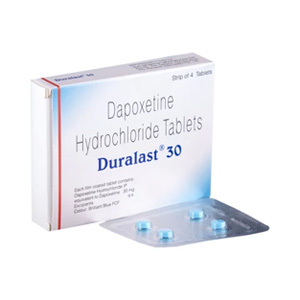Sorry, nothing in cart.
-
$ 2.81
PE Drugs for Premature Ejaculation Treatment in Men
Premature ejaculation (PE) is also referred to as rapid ejaculation, premature climax, or early ejaculation. Just before or shortly after the beginning of sexual intercourse a man ejaculates or climaxes, which is sooner than he or his partner would want. Due to over excitement or sometimes due to health complications, Premature Ejaculation issues exist and they are common. It mainly results in dissatisfaction with your partner and thus it can hurt your relationship.
As many as 1 in 3 men complain about this problem at some point in their lives. When the episodes of early ejaculation are occasional, they are not a cause of concern. However, if half of your attempts at sex are resulting in premature ejaculation, it becomes a sexual complaint. You do not have to live with this problem, as there are things you can do to last longer in bed. It is appropriate to seek medical treatment.
What Is Premature Ejaculation?
There is no fixed time when a man should ejaculate during sex. However, it is probably too soon if he gets orgasm before he or his partner would like to have. It is a problem as the moment you ejaculate you lose the capacity of satisfying your partner and continue having sex. You and your sex partner may feel there is not enough duration to enjoy it. It is not something to worry about if it happens only occasionally.
Symptoms and Classification
The main symptom of premature or early ejaculation is the inability to delay ejaculation for more than a minute after penetration. The problem might take place in all sexual situations, even during masturbation.
- Primary premature ejaculation – Premature ejaculation that is lifelong and occurs nearly all of the time starting with your first sexual encounters.
- Secondary or acquired premature ejaculation – It develops after you have had previous sexual experiences without ejaculation problems.
Many men realize that they have symptoms of premature ejaculation; however, the symptoms do not meet the diagnostic criteria for PE. Instead, they might have natural variable premature ejaculation that includes periods of rapid ejaculation and periods of normal ejaculation as well.
What causes PE?
The cause is not known. Men who have lower levels of the serotonin in their brains take a shorter time to ejaculate.
Psychological factors play a role in this, which includes sexual abuse, early sexual experiences, poor body image, depression, and worrying about premature ejaculation. Physical causes include an abnormal level of brain chemicals called neurotransmitters, abnormal hormonal levels, inflammation/infection of the prostate or urethra, inherited traits.
Other factors that might play a role include relationship problems. If you have had good sexual relationships with other partners, PE happened infrequently or not at all. So, interpersonal relationship issues between you and your partner may be contributing to the problem.
Sometimes PE can be a problem for men already having erectile dysfunction that is when the penile organ is not able to remain hard enough for sex. Men who worry that they could lose their erection may form a pattern of rushing to early ejaculation.
Taking treatment for erectile dysfunction issue may make the PE go away and for that, there are many options such as medications including sildenafil citrate (Viagra), tadalafil (Cialis) or vardenafil (Levitra). They help to achieve and maintain an erection.
When to see a doctor?
See a doctor if you ejaculate quicker than you and your partner wish during most sexual encounters. However, it is common for men to feel anxious or embarrassed about discussing sexual health concerns, do not hesitate from talking to your doctor. Remember that, PE is a common and treatable condition.
Having conversation with a doctor might help to lessen concerns about PE. It might be reassuring to understand that occasional PE is normal and that the average duration from the beginning of sex to ejaculation is about five minutes.
PE Medications
Selective serotonin reuptake inhibitors (SSRIs) – Dapoxetine, duloxetine, escitalopram (Lexapro), paroxetine (Paxil), sertraline (Zoloft), or fluoxetine (Prozac, Sarafem).
Analgesics – Tramadol (Ultram) is a medication commonly used to treat pain. It has side effects that delay ejaculation.
Phosphodiesterase-5 inhibitors – Sildenafil citrate (Viagra), tadalafil (Cialis) or vardenafil (Levitra).
 US: 1-888-618-2818
US: 1-888-618-2818
